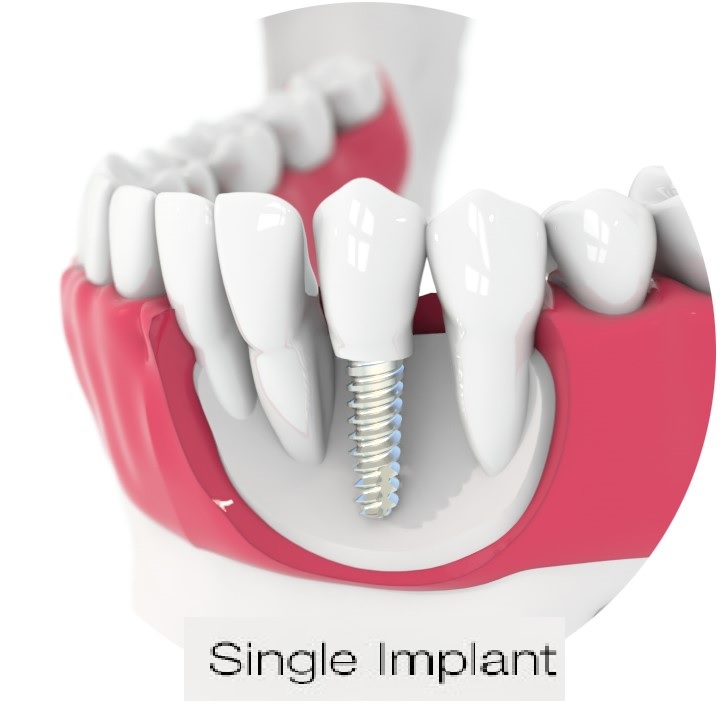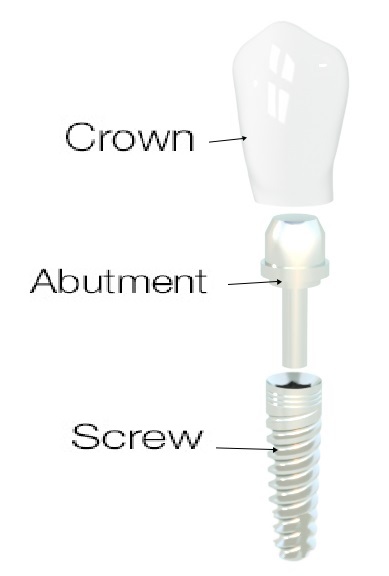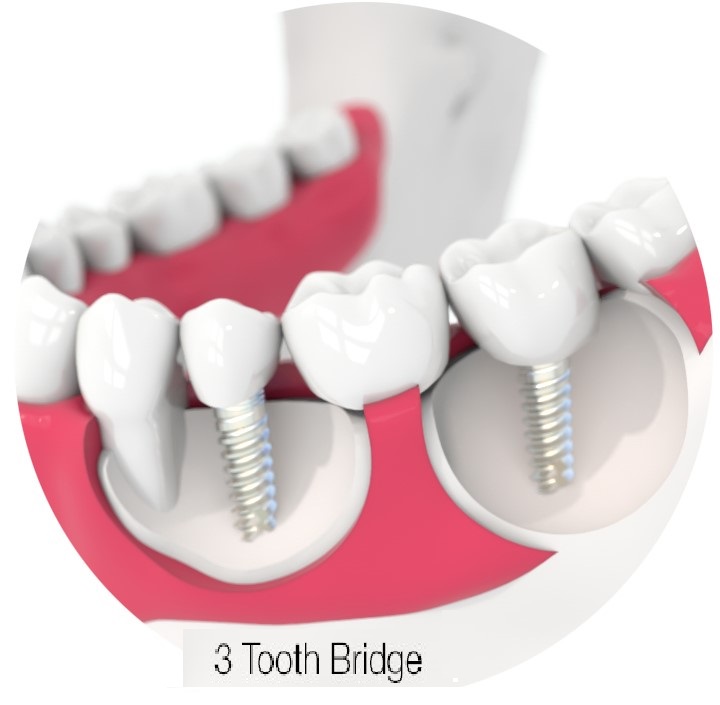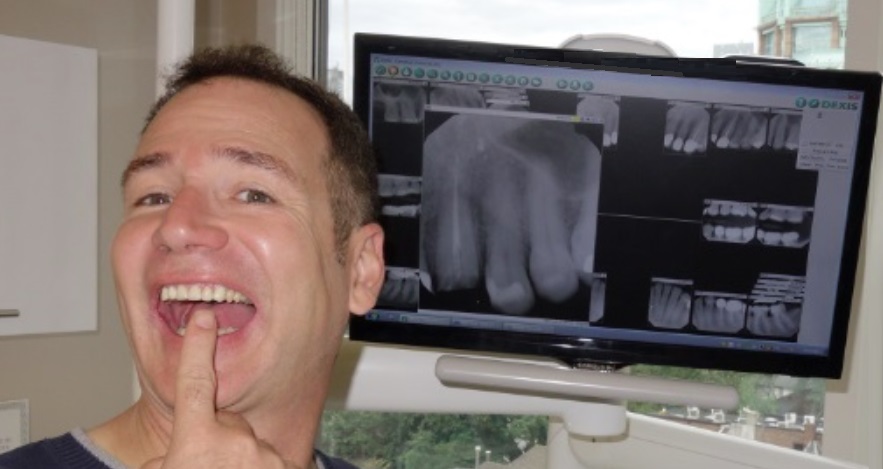Dental implants are the best way to replace missing teeth. More costly than bridges, partials or complete dentures, dental implants are a premium tooth replacement solution because they’re comfortable and require almost no maintenance and because they look like real teeth.
- What are dental implants?
- Why do people get dental implants?
- How long do dental implants last?
- Why do dental implants take so long?
- How many visits are required for dental implants?
- VIDEO: Step by step – Dental Implant Surgery
- Is getting dental implants painful?
- How much does a dental implant cost?
- Do dental insurance plans cover tooth implants?
- Can you get braces with dental implants?
Dental implants are titanium screw-like devices which act as replacement teeth. The miracle is that they also replace roots because the metal fuses into the patient’s jawbone. The biological process of adhering something to a living human bone is known as osseointegration or functional ankylosis which is another way of saying bone adherence. This science has greatly enhanced the efficacy of modern dental implants.


A dental implant is made of three parts – the implant (screw), an abutment (attached screw to new tooth), and a crown, bridge, or denture to replace your missing tooth or multiple teeth.
Crown – The crown is a ceramic false tooth that is mounted atop the abutment and provides the look and function of a natural tooth
Abutment – The abutment is fastened to the implant and holds the crown.
Implant – The titanium or zirconia post that is surgically embedded into the jawbone of a patient and serves as a root for the crown.
Why do people get dental implants?
Dental implants are used to replace missing teeth by creating the necessary below-the-gum line infrastructure required to support replacements. Patients that are missing a tooth, or teeth, have many options for fixing their smiles, but none are as comfortable or as easy-to-maintain as a dental implant. This advanced remedy is offered as an alternative to bridges, partials, or complete dentures. Dental implants offer many advantages and foremost is how they are so low maintenance, comfortable, and how they look just like natural teeth.
How long do dental implants last?
With proper care dental implants can last 30- 40 years. Smoking, pre-existing medical conditions and periodontal disease have now become the leading reasons that dental implants fail.
Archer Dental uses Neodent dental implants. Neodent is the second-largest dental implant company in the world and has more than twenty-five years of experience making titanium and zirconium hardware for our industry. In addition to their market leading research and development, patients benefit from performance studies where over 250 test programs have proved their product’s safety and efficacy. Not sure where this came from, sometimes we use Neodent, sometimes BioHorizons, occasionally Astra.
Why do dental implants take so long?
Implants require several complex steps required to make sure that implant integrates into the bone. Time is allowed for healing and X-rays are taken at various points in the journey so dentists can assess the site and determine the implant’s viability. Molds are taken so lab technicians can customize the prosthetic.
How many visits are required for dental implants?
Most patients require 3-5 appointments from start to completion of implant placement. You may need more depending on how and why the tooth or teeth went missing in the first place and if you require additional procedures. The entire process can take between 12 and 20 weeks.
Appointment 1 – Examination to determine if dental implants are right for you. At this visit we will discuss your unique treatment plan
Appointment 2 – The actual implant is placed in your bone and left to heal for the next few 3*4 months
Appointment 3 – The implant is uncovered and the office takes impressions to start fabricating the permanent restoration
Appointment 4 – the patient’s new crown and bridge or denture is placed!

VIDEO: Step by step – Dental Implant Surgery
The science of re-making a natural smile is very involved.
Is getting dental implants painful?
Dental implant surgery is among the most challenging medical procedures performed inside modern dental clinics. Most of our patients report they have less discomfort getting the implant then taking a tooth out. During the procedure the tooth is ‘frozen’ with anesthesia and the patient shouldn’t feel any discomfort. There may be some postoperative discomfort or soreness such as swelling, bruising, difficulty chewing on the affected area. This pain and swelling should resolve itself after a few days. Archer Dental recommends using Advil or Tylenol or other over-the-counter medications to mitigate any such unease.

Cost of dental implants in Toronto?
As per the ODA Fee Guide, the price for dental Implants begins at approximately $4200 including the crown. The fee can be affected by the difficulty of the surgery.
Dental implants are among the most expensive procedures available at Archer Dental due to the complexity of the procedure. The cost can be magnified by additional dental procedures which may be required (for example, bone grafting).
Does health insurance cover dental implants?
Most dental plans will not pay anything towards dental implants. But insurance providers will probably cover some portion of the cost of a bridge that would replace the missing tooth, and our staff is always happy to submit an estimate on your behalf. If your policy does indeed cover implants, they’ll want to check your Annual Maximum, and Pre-existing conditions.
Annual maximums: Insurance companies frequently set an annual maximum amount which represents the total payout that a plan will produce for dental care in one calendar year. If the patient is close-to or has reached their annual allotted maximum, they’ll likely be personally responsible for the cost of the treatment, or possibly the amount up to total allotment.
Pre-existing conditions: Patients need to check their insurance coverage for clauses exempting coverage because of pre-existing conditions. For example, if patients are already missing a tooth before the effective date of insurance coverage, their insurance policies may not cover a replacement. Insurers could consider that a pre-existing condition because it was present before enrolling with the company.
Questions to Ask Insurance Company about Dental Implants:
To help our patients navigate dental insurance coverage and the benefits present in policies, here are questions to ask insurance providers when discussing dental implants:
- Are dental implants covered? What is the Coverage Structure?
Insurance plans vary and while some offer small percentages of coverage, others might pay half or two-thirds of the total cost of a dental implant. But read the terms and conditions, for that coverage could be defined by procedures. For example, an insurance provider might cover 100% of exams and only 80% of tooth extractions and only 33% of the implant hardware costs and lab fees. They could fund both necessary or unnecessary steps for a dental implant procedure, and so patients should be sure they know every aspect of what’s covered. - Are policy holders allowed to choose their dentist or orthodontist? What criteria?
Some insurance policies do not allow enrollees to select their own dentist, while others do. Orthodontists don’t place implants…. Not sure we should have this in…. - Is there a Least Expensive Alternative Treatment (LEAT) or Alternate Treatment clause
LEAT clauses mean the patient’s insurance only covers the least expensive treatment option. This would only apply if the patient in question has more than one way to treat his or her dental condition, which is often the case with dental implants as dentures or partials are cheaper. - Which aspects of a dental implant procedure does the insurance policy not cover?|
A patient’s insurance might only cover the costs of the artificial teeth and contain no funds for the surgery or exams while others might be just the opposite. Certain insurance policies only cover the exam or extraction and offer nothing for dental implants to replace the missing tooth. Sometimes the best way to get a sense of what’s included is by troubleshooting the omissions. - Can patients schedule dental appointments at their convenience? Timelines?
Patients with dental insurance should be aware of timelines related to any change-of-work status or changes made to the policy coverage and if there are any restrictions on when they can schedule dental implant appointments and expect reimbursement and how long will they wait?
Can dental implants fall out?
While it is possible for dental implants to simply fall out, (because they were rejected by the patient’s body) the scenario has become a rare occurrence in modern times. If a patient calls the office to tell us that their dental implant has come free and fallen from their mouths, then the dentists or dental office personnel works to determine what exactly came loose. They’ll likely ask for a photo of the piece. This is because, most of the times, it’s the upper attachment or abutment screw that has broken away and not the actual implant. If the implant really has fallen out, the patient needs to be examined for other medical issues, given antibiotics and then, in time, other suitable dental options.
Can you get braces with dental implants?
Yes, it is certainly possible to wear braces or use clear tray aligners with implants, but always remember the titanium mount that holds the dental implant is drilled straight to the bone and will not shift. Presumably, the dentist who performed the implant installed a perfectly correct tooth in proper alignment and so there should be no need for further orthodontic treatment. Unlike natural teeth, which are supported by the mouth’s fleshy periodontal ligament, implants sit directly in the jawbone, which means braces cannot move them.
But what if the patient has an implant and crooked teeth? The they are in luck because it is possible to use dental implants as ‘anchor points’ from which to shift other teeth to create a better, more balanced smile. So, while orthodontic braces cannot shift the position of dental implants, the implant itself can help shift the position of other teeth in treatment.
Where can you get dental implant surgery in Toronto?
Dental implant surgery happens with some regularity at Archer Dental Baby Point, and Archer Dental Little Italy and at Archer Dental Rosedale at Sherbourne Ave. & Bloor Street in Toronto.
Is your smile missing a tooth? Dental implants may be the solution.

